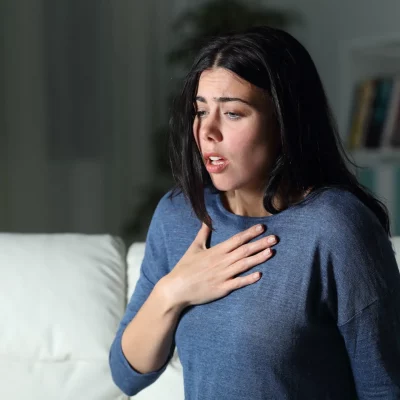Generalized anxiety disorder (GAD) is the most common anxiety disorder in the U.S., and the statistics continue to grow. With demanding work schedules, societal pressures, and the state of the world today, you can feel deep levels of stress without knowing how to calm your system.
Prolonged elevated levels of stress can wreak havoc on your mental, physical, and emotional health. Due to this, it is essential to learn how to manage your stress levels even when your surroundings can be challenging to change.
This article will help you understand what you’re experiencing by identifying GAD symptoms, the criteria for GAD diagnosis, and available treatment options.
How common is generalized anxiety disorder?
GAD is very common in North America, as it affects approximately 6.8 million adults. This accounts for 3.1% of the U.S. population, with twice as many females affected by this than males.
GAD can occur to anyone, with the highest risk being between childhood and middle age years. No experts know where GAD comes from, but many believe there’s a link between genetics and difficult life experiences.

GAD Symptoms
Generalized anxiety disorder, like most mental health conditions, has a set of standard symptoms associated with it.
Typical generalized anxiety disorder symptoms include:
- six or more months of consistent, chronic worry and tension
- difficulty managing daily tasks
- restlessness
- difficulty concentrating
- increased muscle tension
- disrupted sleeping patterns
If you are experiencing GAD, you may have difficulty controlling your level of worry on legitimate issues and issues that you may hyper-fixate on but are not urgent issues.
You may believe that if you worry about a situation, you can prevent it from happening. This means that if you stop worrying, that could make the problem worse and happen sooner than if you had just kept it up initially.
This common anxiety situation is called the cycle of worry. It is easy for you to get stuck in the cycle and feel like you may never stop this vicious cycle.
There is hope, and it starts with a diagnosis from a Makin Wellness therapist specializing in anxiety disorders.
GAD diagnosis critera
When you talk to a Makin Wellness therapist, they will ask you questions to understand your symptoms better, how long you have experienced them, and how intense they are. The results of that test can help you know if you have GAD or simply a lot of worry, and potentially lead to a generalized anxiety disorder diagnosis.
GAD vs. worry
The most significant difference between GAD & worry is that worrying tends to relate to only one specific stressor and lasts a much shorter period than GAD symptoms last.
What if I have more symptoms?
GAD could occur along with another disorder, such as addiction or depression, and is very common. Co-occurring disorders will also be treated by your counselor once diagnosed. They will be included in your personalized treatment plan.

Can I live a fulfilled life with GAD?
To live your best life, it is essential to understand your symptoms and know how this disorder may affect you. Many people with GAD manifest physical symptoms as well.
Common physical symptoms of GAD include:
- gastrointestinal issues
- headaches
- increased blood pressure
There can be times when you turn down good opportunities, such as traveling and social events, due to your disorder. If the person struggles with severe GAD, they could have the most difficult time doing even the simplest daily activities, such as getting to work.
With the guidance and support of your therapist, you can learn essential techniques to help ease the severity of your symptoms. With your support system outside of therapy, you can take small steps to overcome fears and worries to live the life you truly want to experience.
It is possible to have a fulfilling life with GAD. It all starts with seeking a Makin Wellness therapist who can help you understand your symptoms and treatment options to help you overcome them.

Generalized anxiety disorder treatment options
There are many different treatment options available for someone who has GAD.
1. Cognitive behavioral therapy (CBT):
At Makin Wellness, we use cognitive behavioral therapy, which has been thoroughly researched and targets specific thoughts, symptoms, and behaviors to make lasting changes.
CBT is an evidence-based practice, which means that it is scientifically proven effective for many of those who use this technique. Adults and kids who are treated with CBT show positive outcomes and lessened severity of symptoms.
2. Staying in the present moment:
Mindfulness is also important to implement with any anxiety disorder as that helps the client focus on the present rather than worry about events that are not happening and might never happen.
3. Medication
Medication can also be effective if the client prefers to go that route. Usually, for GAD, an SSRI, or selective serotonin reuptake inhibitor, is prescribed. SSRIs help to increase serotonin levels in the brain, which helps balance out your mood.
These can be very effective for people with GAD, are non-addictive, and usually only have minimal side effects. Common SSRIs are Prozac, Paxil, Lexapro, and Zoloft.
4. Calming techniques:
Deep breathing and relaxation techniques are essential to incorporate into your treatment plan for lasting relief from anxiety symptoms. Guided meditations, yoga, exercise, spending time outside, and other enjoyable activities that encourage you to be present in the moment can significantly assist with reducing GAD.
Conclusion
Generalized anxiety disorder (GAD) is one of the most common mental health and anxiety disorders in the U.S. the level of stress from work, the rising cost of living, and societal pressures lock in the stress response for most Americans.
The good news is that you can find relief from your GAD symptoms by connecting with a Makin Wellness therapist who specializes in anxiety disorders and learning techniques and treatment options to help ease the severity of your symptoms.
Are you ready to stop letting anxiety run your life? If you are struggling with generalized anxiety disorder (GAD), call us today at (833)-274-heal or schedule your first appointment to prioritize your mental health and take one step at a time toward better mental health.








This Post Has 2 Comments
It’s great that you talked about generalized anxiety and its symptoms. In my opinion, it’s important to talk about mental illness and its consequences. I believe a lot of us could be dealing with a mental illness without even knowing. I think you did a great job explaining how GAD is a very common mental illness.
Thank you for your input Eli. We apologize for our late response. We appreciate your contributions to this conversation. We agree that many of us may be suffering without being aware and it is so important to continue this conversation and break the stigmas associated with getting help. We all deserve to live our best lives!